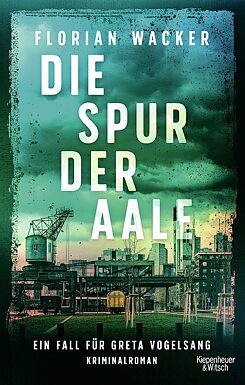Cherrypicker
Fishing in Troubled Waters
A Frankfurt customs investigator finds an eel head on his doorstep. The next day, he doesn’t survive his fishing trip. The police say it was an accident. The public prosecutor thinks otherwise.
Enter Greta Vogelsang. The prosecutor with the poetic surname works in the Frankfurt department for environmental crimes and species protection offences. In Die Spur der Aale (The Trail of Eels), novelist Florian Wacker sends her into the fight against evil for the first time. And Greta virtually throws herself into the case – in part because she is driven by her guilty conscience. After all, the customs investigator Matthissen had tried to reach her just a short time before and announced that he was on the trail of something big. And now, in the merciless heat of the Frankfurt summer, his body is pulled out of the river – showing signs of a struggle.
The crime novel must now accomplish two things: On the one hand, it must continue to trace the events surrounding the dead customs investigator with an unrelenting arc of suspense. The fact that it was indeed a crime and not an accident, as the police initially suspected, becomes clearer page by page. On the other hand, the protagonist and her private and professional environment have to be introduced – because this crime novel is a beginning. The last page of the book announces “Prosecutor Greta Vogelsang continues her investigations.” Her next case is therefore already waiting to be solved.
Special contraband
Back to the eels, more precisely, the glass eels as the juveniles of this fish species are called. The reveal that the plot actually revolves around the large-scale, extremely lucrative smuggling of these special aquatic creatures – the eel is on the Red List of Endangered Species – from Europe to Asia doesn’t ruin the suspense. It’s even mentioned in the crime novel’s blurb.Learning who is involved in the wildlife crime and in what way and how the investigating authorities gradually get to the bottom of it is fascinating. Florian Wacker changes the narrative perspective again and again – and sets the stage, for example, for hapless Paul from Nantes in France who gets involved in the smuggling network out of carelessness and the urgent desire to finally get on his feet and impress his girlfriend. And we get to know Mian, a young woman from Hong Kong who, in search of a better life, has ended up in a dodgy restaurant at Frankfurt airport and is put under pressure in the worst possible way by the gang of criminals. These and additional characters are an asset to the story, increase the tension, and you feel empathy. Will things end well? You want to know from the outset.
The investigations get off the ground slowly and with various delays caused by bureaucratic hierarchies – almost like in real life. But at the same time, in terms of the entertainment factor, it is very pleasant not to have to deal with cruel serial killers, constant action, alcoholic macho detectives or a crime in the bone-chilling world of high finance – the latter would be expected given the setting in Frankfurt, but it’s a subject that has been treated far too often.
On the move in Frankfurt
Frankfurt gets a different look here: a city where you can cycle and hang out in pubs near the river, which has a large organic and farmers’ market on the Konstabler Wache and cosy apple wine taverns. Public prosecutor Greta Vogelsang spends time in such places to relax after work or when she has to think over puzzling details. Unlike so many crime novel protagonists, she’s in a good relationship with an understanding partner and her parents slow decline grieves her. There are two cats, whose names “Marx” and “Engels” indicate Greta’s affinity for left-wing ideas. Her participation in a demonstration against globalisation at the G8 summit in 2001 seems to have been a traumatic experience, but we are not (yet) told why. Similarly, some of Greta’s co-workers and superiors carry a secret or unspoken burden with them, without the author revealing it here and now. But the characters from the police and the public prosecutor’s office are drawn true to life and full of personality – perhaps they will reveal a little more in the next volume.The pursuit of profit
And how did Florian Wacker come up with this plot for his first crime novel, which at first sounds absurd? He drew on reality. In fact, in 2018 there was a (thwarted) attempt to bring about 100,000 glass eels to Asia via Frankfurt Airport. The angling trade publication Blinker.de, where all this can be read, summarises the motives for the criminal act: “In Asia, glass eels are considered a delicacy and are said to have a potency-enhancing effect. As stocks dwindle, black market prices rise accordingly.” And the smuggling continues, species protection or not – for the age-old reason of supply and demand.Fortunately, there were no deaths in the real 2018 case. In Florian Wacker’s crime novel, however, there were, which is almost logical when we hear Greta Vogelsang’s laconic conversation with her colleague Uwe:
“What if I told you that they make similar profit margins on the glass eels as they do on the arms and drug trade?”
“I’d say, ‘Oho!’”
“Exactly, my friend.”
It is a crime novel that’s not only highly entertaining, but enlightening – worth reading! Looking forward to hearing more from Greta Vogelsang.
Florian Wacker: Die Spur der Aale. Ein Fall für Greta Vogelsang
Köln: Kiepenheuer & Witsch, 2023. 240 p.
ISBN: 978-3-462-00345-1

